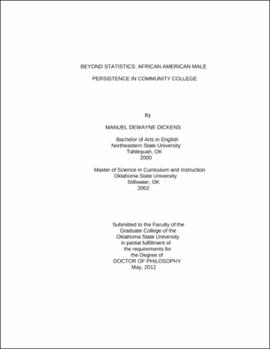| dc.contributor.advisor | Brown, Pam | |
| dc.contributor.author | Dickens, Manual Dewayne | |
| dc.date.accessioned | 2013-11-26T08:34:22Z | |
| dc.date.available | 2013-11-26T08:34:22Z | |
| dc.date.issued | 2012-05 | |
| dc.identifier.uri | https://hdl.handle.net/11244/7369 | |
| dc.description.abstract | Scope and Method of Study: The purpose of this qualitative case study that consists of six African American male participants is to examine, describe, and analyze African American male persistence factors at a community college in the midwest of the United States. The study uses qualitative content analysis as a research method that provides a systematic and objective means of describing and quantifying phenomena. This content analysis is coupled with the Critical Pedagogy put forward by Paulo Freire. | |
| dc.description.abstract | Findings and Conclusions: As a result of interviews, email correspondence, and focus group discussions with the six participants, 372 items facing African American males were identified. Of these, 139 items were related to a theme of institutional factors, 90 to family and community membership, 75 to personal values and goals, and 68 to managing college and life. The findings for the six participants shed new light on the context of what distinguishes the African American male experience from other college students in the areas of self-sufficiency beyond financial support; how African American males perceive their female counterparts as being raised with different sets of expectations that influence applicable behaviors in the community college setting; and how peer and institutional "amazed gazes" that serve as forms of social and institutional stereotyping and racism are part of the African American male daily experience. The findings for the study indicate that stereotyping and self-sufficiency emerge as the most commonly mentioned barriers to persistence, pointing to a need for multiple countering strategies to help these students persist beyond these obstacles. The findings point to four factors most commonly identified as promoting persistence: family involvement, school as a priority, teacher mentoring, and community membership. With these items in mind, students have a clear need to balance their persistence barriers and persistence promoters, developing more of the latter. | |
| dc.format | application/pdf | |
| dc.language | en_US | |
| dc.rights | Copyright is held by the author who has granted the Oklahoma State University Library the non-exclusive right to share this material in its institutional repository. Contact Digital Library Services at lib-dls@okstate.edu or 405-744-9161 for the permission policy on the use, reproduction or distribution of this material. | |
| dc.title | Beyond statistics: African American male persistence in community college | |
| dc.contributor.committeeMember | Wang, Hongyu | |
| dc.contributor.committeeMember | Zhao, Guoping | |
| dc.contributor.committeeMember | Sheorey, Ravi | |
| osu.filename | Dickens_okstate_0664D_12058 | |
| osu.accesstype | Open Access | |
| dc.type.genre | Dissertation | |
| dc.type.material | Text | |
| dc.subject.keywords | african american male | |
| dc.subject.keywords | community college persistence | |
| dc.subject.keywords | community college retention | |
| dc.subject.keywords | freire critical pedagogy | |
| dc.subject.keywords | qual | |
| thesis.degree.discipline | Teaching and Curriculum Leadership | |
| thesis.degree.grantor | Oklahoma State University | |
